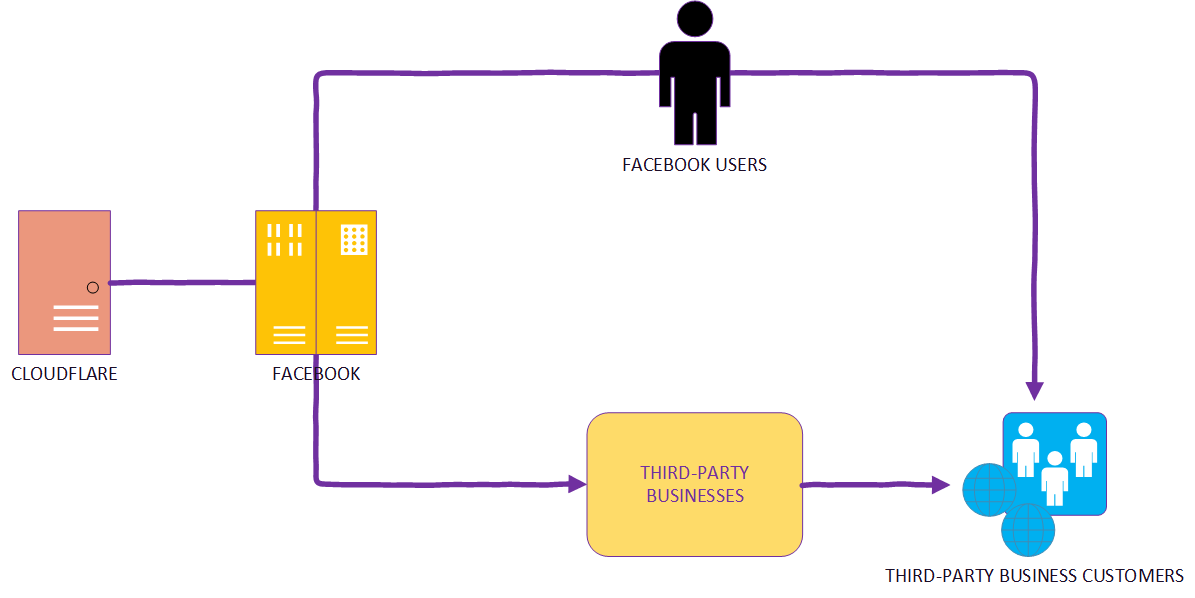The Case Background
Facebook and its other platforms, including Instagram, WhatsApp and Messenger, went down globally for close to six hours on 4th/5th October 2021. It would be more than five hours before services would begin to be restored. Facebook has not gone into much detail about what went wrong and how it was fixed.
Scenario Diagram
Figure 1 shows how all five stakeholders are interconnected by the scenario that affected many people across the globe when Facebook went down. There has to be an understanding of why the connections between stakeholders have been established, as similar failures will often remain unpredictable. Thus, the diagram shows a streamlined process of communication between stakeholders and hints at the potential outcomes of such interactions.

Rationale and Valuable Insights
The rationale for drawing the case study diagram was to display how Facebook remains in the middle of the issue despite maintaining silence or making it look like the company is not to blame for the outage. Based on the diagram, it can be concluded that Facebook has to be held accountable for network failures at all times because too many people and businesses depend on it daily. The most valuable insight is the fact that Facebook failed to mitigate the issue quickly while issuing a decent apology and ensuring that access to all vital Facebook functions has been restored.
Key Stakeholders
Facebook – the key stakeholder in the case study because this company is responsible for providing access to personal information and business tools that have to be updated instantly.
Facebook users – these stakeholders are responsible for providing feedback regarding Facebook accessibility and usability.
Cloudflare – this stakeholder is responsible for providing adequate networking services to numerous customers, including Facebook.
Third-party businesses – another vital stakeholder, as Facebook serves as a platform for many businesses operating online.
Business clients – stakeholders who depend on third-party businesses and, in turn, have to rely on services provided by Facebook.
Failure Analysis
The most significant failure that has to be analyzed after assessing the case study is the fact that Facebook did not have a quick response strategy to protect itself from negative backlash and data loss. The nature of this failure stems from the fact that Facebook did not invest in its relationship with suppliers and customers, exposing itself to major negative outcomes. According to Velenturf and Jopson (2019), data recovery is one of the primary activities that have to be rehearsed by large businesses. Facebook ignored similar issues affecting Cloudflare and had to cope with a serious outage that might have cost hundreds of thousands or even millions to business owners depending on the social media mogul.
This scenario can be considered a failure because it proves that Facebook is not ready for large-scale failures. It seems like the company does not invest enough resources in its security and relations with stakeholders. The outage occurred due to untimely checks and verifications that might have created a wrongful image of Facebook not being prone to failures at all. Weak risk management lured the administration into believing that the link between the company and its stakeholders was not as tight as initially expected.
Considering the peculiarities of the case study, it is safe to say that Facebook is the only stakeholder that might not have agreed to label the incident as a failure. From the point of view of the social media mogul, it could have been addressed as an unexpected malfunction that was never met by the company in the past. Consistent with Felin et al. (2019), social media networks are the most prone to various attacks and unexpected incidents because hackers often aim at vast volumes of data. Even if it was a mere power outage that forced Facebook to go down, the team should still be held liable for not addressing the issue quicker.
References
Felin, T., Felin, M., Krueger, J. I., & Koenderink, J. (2019). On surprise-hacking. Perception, 48(2), 109-114.
Velenturf, A. P., & Jopson, J. S. (2019). Making the business case for resource recovery. Science of the Total Environment, 648, 1031-1041.